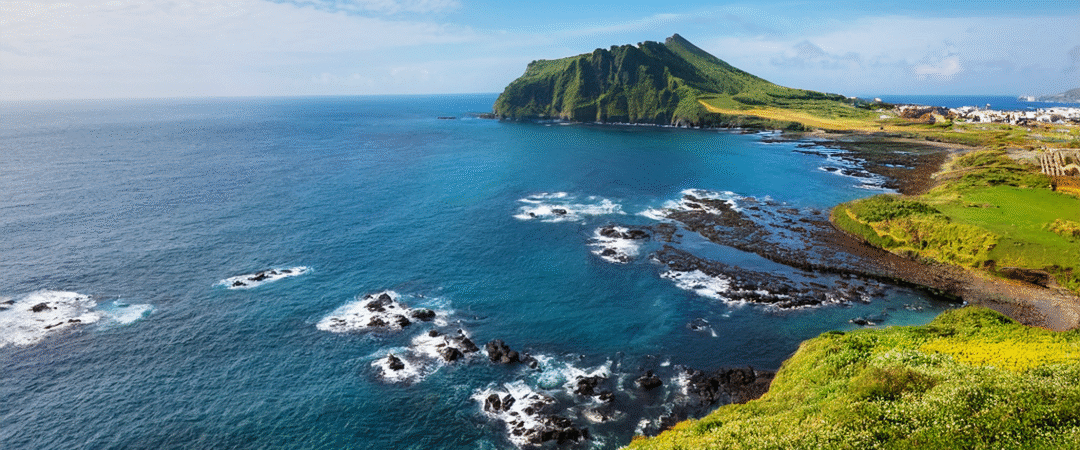When you think of South Korea, chances are you picture the neon-lit streets of Seoul, the efficient public transport, and the fast-paced urban lifestyle. But head south, across the sea, and you’ll find Jeju Island – a volcanic paradise with a vastly different rhythm of life. For anyone considering a move or an extended stay, understanding these distinctions is key.
1. Pace of Life: Hustle and Bustle vs. Relaxed Island Living
Mainland South Korea (especially major cities): Life here is famously fast-paced. Efficiency is paramount, and everything moves with a sense of urgency. From the lightning-speed internet to the rapid-fire conversations, urban South Korea thrives on dynamism. Work culture can be demanding, and social calendars are often packed.
Jeju Island: In stark contrast, Jeju embraces a much more relaxed and laid-back pace. The island’s natural beauty encourages a slower lifestyle. People tend to be less rushed, and there’s a greater emphasis on enjoying the outdoors and the tranquility of the environment. While there are still work commitments, the overall atmosphere is noticeably less intense.
2. Environment: Urban Jungle vs. Natural Paradise
Mainland South Korea: Dominated by sprawling metropolises, the mainland offers a highly urbanized environment. While there are beautiful national parks and rural areas, daily life for many revolves around concrete, glass, and constant stimulation. Air quality can also be a concern in larger cities.
Jeju Island: Jeju is a UNESCO World Heritage site, celebrated for its stunning natural landscapes. Volcanic peaks, pristine beaches, lush forests, and unique rock formations are the backdrop to daily life. Residents often have easy access to hiking trails, surfing spots, and scenic drives. The air is generally cleaner, and the connection to nature is much more immediate.
3. Cost of Living: Varied but Generally Lower on Jeju
Mainland South Korea: The cost of living in major cities like Seoul can be quite high, particularly for housing. While public transportation is affordable, groceries and dining out can add up.
Jeju Island: Generally, the cost of living on Jeju Island is lower than in Seoul, especially when it comes to rent. While some imported goods might be pricier due to shipping, local produce and seafood are often more affordable. The need for extensive public transportation is also less, as many residents rely on cars or scooters.
4. Job Opportunities: Diverse vs. Niche
Mainland South Korea: Major cities offer a vast array of job opportunities across various industries, including technology, finance, education, and manufacturing. Competition can be fierce, but the options are diverse.
Jeju Island: Job opportunities on Jeju are more niche, primarily revolving around tourism, agriculture (especially citrus farming), and education. While there are growing sectors, the overall job market is smaller and more specialized. Those seeking careers outside these areas might find it more challenging.
5. Culture and Community: Modern vs. Traditional/Island-Specific
Mainland South Korea: Mainland culture, especially in cities, is heavily influenced by global trends, K-pop, and a highly competitive educational system. While traditions are still respected, modern consumerism and digital life play a significant role.
Jeju Island: Jeju possesses a distinct cultural identity, often referred to as “Jeju-do culture.” This includes unique dialects, traditional architecture, and a strong sense of community, particularly in smaller towns. The island’s history and mythology are deeply intertwined with daily life, offering a more traditional and perhaps less “Korean” (in the mainland sense) experience.
6. Transportation: Highly Efficient vs. Car-Dependent
Mainland South Korea: South Korea boasts one of the most efficient public transportation systems in the world, particularly in major cities. Subways, buses, and high-speed trains make getting around incredibly convenient and affordable.
Jeju Island: Public transportation on Jeju is less extensive. While buses connect major towns and tourist spots, having a car or scooter is almost essential for getting around and truly exploring the island at your own pace.
Which is Right for You?
Choosing between living in mainland South Korea and on Jeju Island ultimately depends on your priorities and lifestyle preferences.
- Choose mainland South Korea if you thrive in a dynamic, fast-paced urban environment, prioritize career opportunities in diverse fields, and enjoy the convenience of extensive public transportation and a vibrant social scene.
- Choose Jeju Island if you yearn for a slower pace of life, a strong connection to nature, a more relaxed atmosphere, and don’t mind a smaller, more specialized job market.
Both offer unique and enriching experiences, providing a glimpse into the diverse tapestry of South Korea. Whether you prefer the urban hum or the ocean’s whisper, South Korea has a place that might just feel like home.
